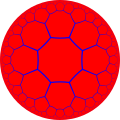Order-3-6 heptagonal honeycomb
| Order-3-6 heptagonal honeycomb | |
|---|---|
| Type | Regular honeycomb |
| Schläfli symbol | {7,3,6} {7,3[3]} |
| Coxeter diagram | |
| Cells | {7,3} 
|
| Faces | {7} |
| Vertex figure | {3,6} |
| Dual | {6,3,7} |
| Coxeter group | [7,3,6] [7,3[3]] |
| Properties | Regular |
In the geometry of hyperbolic 3-space, the order-3-6 heptagonal honeycomb a regular space-filling tessellation (or honeycomb). Each infinite cell consists of a heptagonal tiling whose vertices lie on a 2-hypercycle, each of which has a limiting circle on the ideal sphere.
Geometry
[edit]The Schläfli symbol of the order-3-6 heptagonal honeycomb is {7,3,6}, with six heptagonal tilings meeting at each edge. The vertex figure of this honeycomb is a triangular tiling, {3,6}.
It has a quasiregular construction, , which can be seen as alternately colored cells.
 Poincaré disk model |
 Ideal surface |
Related polytopes and honeycombs
[edit]It is a part of a series of regular polytopes and honeycombs with {p,3,6} Schläfli symbol, and triangular tiling vertex figures.
| Form | Paracompact | Noncompact | |||||
|---|---|---|---|---|---|---|---|
| Name | {3,3,6} {3,3[3]} |
{4,3,6} {4,3[3]} |
{5,3,6} {5,3[3]} |
{6,3,6} {6,3[3]} |
{7,3,6} {7,3[3]} |
{8,3,6} {8,3[3]} |
... {∞,3,6} {∞,3[3]} |
| Image | 
|

|

|

|

|

|

|
| Cells | {3,3} |
{4,3} |
{5,3} |
{6,3} |
{7,3} |
{8,3} |
{∞,3} |
Order-3-6 octagonal honeycomb
[edit]| Order-3-6 octagonal honeycomb | |
|---|---|
| Type | Regular honeycomb |
| Schläfli symbol | {8,3,6} {8,3[3]} |
| Coxeter diagram | |
| Cells | {8,3} 
|
| Faces | Octagon {8} |
| Vertex figure | triangular tiling {3,6} |
| Dual | {6,3,8} |
| Coxeter group | [8,3,6] [8,3[3]] |
| Properties | Regular |
In the geometry of hyperbolic 3-space, the order-3-6 octagonal honeycomb a regular space-filling tessellation (or honeycomb). Each infinite cell consists of an order-6 octagonal tiling whose vertices lie on a 2-hypercycle, each of which has a limiting circle on the ideal sphere.
The Schläfli symbol of the order-3-6 octagonal honeycomb is {8,3,6}, with six octagonal tilings meeting at each edge. The vertex figure of this honeycomb is a triangular tiling, {3,6}.
It has a quasiregular construction, , which can be seen as alternately colored cells.
 Poincaré disk model |
Order-3-6 apeirogonal honeycomb
[edit]| Order-3-6 apeirogonal honeycomb | |
|---|---|
| Type | Regular honeycomb |
| Schläfli symbol | {∞,3,6} {∞,3[3]} |
| Coxeter diagram | |
| Cells | {∞,3} 
|
| Faces | Apeirogon {∞} |
| Vertex figure | triangular tiling {3,6} |
| Dual | {6,3,∞} |
| Coxeter group | [∞,3,6] [∞,3[3]] |
| Properties | Regular |
In the geometry of hyperbolic 3-space, the order-3-6 apeirogonal honeycomb a regular space-filling tessellation (or honeycomb). Each infinite cell consists of an order-3 apeirogonal tiling whose vertices lie on a 2-hypercycle, each of which has a limiting circle on the ideal sphere.
The Schläfli symbol of the order-3-6 apeirogonal honeycomb is {∞,3,6}, with six order-3 apeirogonal tilings meeting at each edge. The vertex figure of this honeycomb is a triangular tiling, {3,6}.
 Poincaré disk model |
 Ideal surface |
It has a quasiregular construction, , which can be seen as alternately colored cells.
See also
[edit]References
[edit]- Coxeter, Regular Polytopes, 3rd. ed., Dover Publications, 1973. ISBN 0-486-61480-8. (Tables I and II: Regular polytopes and honeycombs, pp. 294–296)
- The Beauty of Geometry: Twelve Essays (1999), Dover Publications, LCCN 99-35678, ISBN 0-486-40919-8 (Chapter 10, Regular Honeycombs in Hyperbolic Space) Table III
- Jeffrey R. Weeks The Shape of Space, 2nd edition ISBN 0-8247-0709-5 (Chapters 16–17: Geometries on Three-manifolds I, II)
- George Maxwell, Sphere Packings and Hyperbolic Reflection Groups, JOURNAL OF ALGEBRA 79,78-97 (1982) [1]
- Hao Chen, Jean-Philippe Labbé, Lorentzian Coxeter groups and Boyd-Maxwell ball packings, (2013)[2]
- Visualizing Hyperbolic Honeycombs arXiv:1511.02851 Roice Nelson, Henry Segerman (2015)
External links
[edit]- John Baez, Visual insights: {7,3,3} Honeycomb (2014/08/01) {7,3,3} Honeycomb Meets Plane at Infinity (2014/08/14)
- Danny Calegari, Kleinian, a tool for visualizing Kleinian groups, Geometry and the Imagination 4 March 2014. [3]